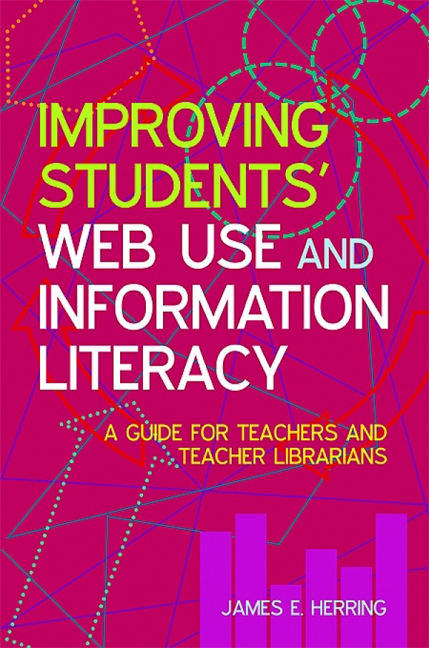Book contents
- Frontmatter
- Dedication
- Contents
- Acknowledgements
- Introduction
- 1 The big picture: learning and teaching in today's schools
- 2 Finding and using information on the web
- 3 Evaluating websites
- 4 Web 2.0 and schools
- 5 Information literacy
- 6 Improving student use of the web
- 7 Developing learning websites for student use - design and tools
- 8 Developing learning websites for student use - content
- 9 The next phase of ICT in schools
- Bibliography
- Index
9 - The next phase of ICT in schools
Published online by Cambridge University Press: 08 June 2018
- Frontmatter
- Dedication
- Contents
- Acknowledgements
- Introduction
- 1 The big picture: learning and teaching in today's schools
- 2 Finding and using information on the web
- 3 Evaluating websites
- 4 Web 2.0 and schools
- 5 Information literacy
- 6 Improving student use of the web
- 7 Developing learning websites for student use - design and tools
- 8 Developing learning websites for student use - content
- 9 The next phase of ICT in schools
- Bibliography
- Index
Summary
Introduction
As the previous chapters in this book have shown, there have been rapid developments in ICT in schools and society in general over the past five years. In the 20th century it was possible to look forward perhaps 10 or 20 years and forecast the changes that would occur in technology. In the 21st century this is no longer possible.
Learning and teaching now deal with how we use technology in the school to provide better education for our students, rather than the formats of technology. In attempting to look forward to the next phase of ICT in schools, we must base any discussion about the future of ICT on the learning and teaching context of schools, which was explored in Chapter 2. We cannot say with any certainty what technologies will dominate education in 2031, but can argue that the emphasis on constructivist approaches to education will continue and that students are likely to be more active participants in their learning in 20 years’ time. In order to give teachers and teacher librarians some possible views of the future of ICT in schools, this chapter will examine 21st-century skills, future developments of the web, future learning technologies for schools, the future role of teachers and teacher librarians, and the continuing need to develop information literate students.
21st-century skills
There has been much debate about what skills and abilities today's students need in order to be effective learners at school and in higher education, and effective employees in the workplace. The implication is that students need different skills than they did in the 20th century. The key skills identified by the Partnership for 21st Century Skills (2010) are learning and innovation skills, information, media and technology skills, and life and career skills. It can be argued that 20th-century students needed similar skills and that it is mainly in the area of social media that new skills are needed.
Teachers and teacher librarians can usefully reflect on whether the new skills needed, for example to be able to use Facebook or Twitter, are any more demanding than those that students may already have acquired when using the web.
- Type
- Chapter
- Information
- Improving Students' Web Use and Information LiteracyA Guide for Teachers and Teacher Librarians, pp. 127 - 134Publisher: FacetPrint publication year: 2010



